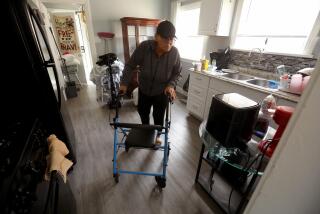Dwelling Is the House That Honesty Built
KANSAS CITY — Rosemary Pritchett’s three-bedroom home is the house that honesty built.
Visitors to a recent open house saw new windows, wiring and walls. The plumbing has been replaced, along with the furnace. The downstairs is carpeted now, and there are frames for the mattresses in the upstairs bedrooms. The latest addition: two cocker spaniel puppies.
Three months ago, Pritchett was homeless, living with her three children in a shelter. But then a missing paycheck brought Cheryl Wood into her life--and honesty and human kindness turned her life upside down.
On that November day, Pritchett, 31, bid $1,200--all the money she had in the world--on an abandoned wreck of a house.
On that same day, she found a $400 paycheck endorsed by Wood, a nurse. She did not hesitate. She called the rightful owner.
Wood picked up her check that night at the Independence shelter where Pritchett was living, one of several where she and her children, Jeremiah, 13; Natasha, 9, and Stephanie, 7, had stayed since their arrival in Kansas City in June.
She offered a $25 reward that Pritchett reluctantly accepted, on the condition that Wood write her a thank-you note.
“I wanted the children to know that when you find something, somebody lost it,” Pritchett said.
Wood also offered help on the house Pritchett had bid on. Perhaps she could paint, she said, or help hang wallpaper.
“I said: ‘Why don’t I call you?’ ” Pritchett said. “I didn’t want her to know we didn’t have walls to paint or paper. The house was just a few boards short of being on the endangered list.”
Wood soon saw it for herself. The boarded-up shell was a long-term project lacking all the essentials--a furnace, electricity, plumbing, even windows. Located across from two vacant lots, it had been abandoned and seized for back taxes by the county, which sold it to Pritchett through a special program.
The job seemed overwhelming, but Wood took it on, working the telephone to find the help the Pritchetts needed. A fellow church member, contractor Charlie Copeland, offered to supervise free of charge. Others jumped in. A plumbing company donated a water heater; a construction supplier built windows. Wood’s uncle installed them.
The project began to snowball after pre-holiday stories about Pritchett appeared in the newspaper.
“We started getting calls, and I started making a list of people,” Wood said. “One Saturday we had 17 people down here working, and not one of them knew the other.”
Donations poured in, far more than the Pritchetts could use: beds for at least three or four families, two queen-sized sofa sleepers, six stoves, four refrigerators, boxes of groceries. A car dealer donated a 1986 Hyundai.
Truckloads of furniture were put in storage--donated, like everything else--until it can be distributed to other needy families, who have contacted Pritchett for help.
“From being homeless, I know the places where people kind of fall through the cracks,” she said. “And those are the people we are trying to help. That’s why this happened to me--because God knew I’d share.”
A sexually abused child in Saginaw, Mich., who bounced through a series of foster homes and schools, Pritchett said she later was battered by one man, betrayed by another and raped by a third.
Evicted from public housing and living on a $386-a-month disability check, the Pritchetts found themselves in homeless shelters, saving what they could and dreaming of a home.
“She’s very determined and can accomplish an awful lot,” said Wood, who speaks with her new friend daily. “And her kids are incredible.”
“I’ve tried, no matter what, to maintain a sense of family,” Pritchett said. “No matter where we were, we were the Pritchetts. We were honest. This is what we did.”
That honesty meant that she felt she had no choice but to return Wood’s check.
“Some have asked me, if you would have been a dishonest person . . . what could you have done with that check? For $400 I could have gone around the corner and bought a furnace, and then started working on the windows.”
“They asked me: ‘Didn’t you realize what you were giving away?’ Of course I did. But that wasn’t the point. The point was that she lost something, I found it, and she needed it back as quickly as possible.”
What will she do now? Go to school in the fall, train as a paralegal, and carry on her charity work indefinitely, Pritchett said.
“I feel that if the Lord’s in it, you will succeed,” she said. “He definitely knew that I would share. And maybe this will help make people aware, when they look at homeless people, they’ll think of them in a different way. They’ll think of them as Rosemarys.”
More to Read
Sign up for Essential California
The most important California stories and recommendations in your inbox every morning.
You may occasionally receive promotional content from the Los Angeles Times.










